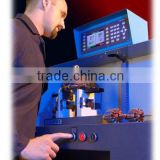Schenck Horizontal Hard-Bearing Balancing Machine Hm20
USD $1,000 - $100,000 /Pack
Min.Order:1 Pack
Quick Details View All >
Schenck Shanghai Machinery Corp., Ltd.
Product Details
Why Balancing?
1) Balancing enhances and creates quality!
Unless it is corrected, the effect of unbalance will often only become noticeable in the finished product. If rotors are not balanced, they can cause undesired or even dangerous vibrations. They can also diminish the practical value of a machine, cause damage to the bearing, or fractures to the casing, suspension or foundation. Excessive noise and vibration may also irritate or annoy the user and lead them to conclude that the product is of poor quality. Thus, a product that is free from noise and vibration is always a sign of quality, precision and craftsmanship.
2) Increasing demands!
More sophisticated technical development have lead to constantly increasing requirements with regard to balancing quality. Higher performance for applications such as high-speed tool spindles, electric motors, turbines, fans, universal joint shafts or paper rolls simply mean higher speed. The trend is clear, and in order to meet these requirements precision balancing is essential. Accurately balanced rotors allow us to safely reach higher speeds and deliver considerably higher performance.
Typical Applications:
Auto: crankshaft, drive shaft, brakes, pulley, armature Aerospace: generator, motor, transmission shaft, APU accessories, wheel Blowers / Compressors / Turbine: ventilator, blower, compressor, turbine Motor: electromotor, generator Machine tool: machanical spindle, electric spindle, tool shank, grinding wheel Pump: centrifugal pump, double suction pump, mixed flow pump, axial flow pump Papermaking: drum dryer,pressing roller, guide roller Textile: spinning cup, split wing, spindle, combing roller,slotted drum, carding machine roller Railway / Vessel: electric motor, blower, marine crankshaft, turbocharger, wheel, train wheel pair
Horizontal Hard-bearing Balancing Machine HM 10 BK
TECHNICAL DATA (basic data)
| provided the rotor weight is equally shared between the two bearings, rotor weight W per bearing pedestal | Max. Max. | 18 kg 9 kg |
| Rotor weight (as long as an accommodation of the rotor is possible due to the geometric data and the minimum achievable residual unbalance is sufficient for the balancing task.) | Min. | unlimited |
| distance between bearing centers (500 mm length machine base) distance between bearing centers with belt drive | Max. Min. Min. | 450 mm 15 mm 40 mm |
| rotor swing diameter above the machine base rotor swing diameter within the motor range | Max. Max. | 360 mm 200 mm |
| journal bearing diameter | Max. Min. | 30 mm 6 mm |
| Belt driving diameter | 10-150 mm | |
| Balancing speeds based upon 50 mm belt driving diameter approx. (With other belt driving diameters, the speeds change accordingly. In addition, the speed range of the measuring unit must be taken into account. See item 2) | 220 - 2 200 rpm | |
| Wn2-value for permanent calibration | Wn2 = 80x106kg/min2 | |
| Umar Minimum achievable residual unbalance (*according to ISO2953) -each bearing plane 0.1 gmm per kg rotor weight -but not better than the maximum measuring sensitivity of the measuring unit 0.2gmm (* This value is refering to the measuring speed of 1000 rpm with CAB708, also influenced by the rotor characteristics and support bearing. see specification of the measuring unit) | ||
| Unbalance reduction ratio (URR) | ≥ 95% | |
Note: The above mentioned data (especially the accuracy data) not means can be achieved the customer rotors, please find the definitions according to ISO 2953 or related international regulations. The drive power chosen out is relative with the work pieces, due to the diversity of out-structure, moment of inertia and wind influence of different rotors, which means not all the biggest rotors can reach the balancing speed as we expected. EXTENT OF DELIVERY: (basic delivery scope)
1 Machine base
2 Bearing pedestals
1 Overslung Belt Drive(BK)
1 Reference pickup
1 Electric drive and control
Accessories: Connect cables, tools, balancing plasticine, 1 set of technical documentation.
Language: Technical documentation and lettering of the machine in English or Chinese.
Electrics: normal voltage 220 Volt ± 10%, frequency 50 Hz. (Special design on request.)
Colour finish: According to SCHENCK standard
Contact Supplier

You May Like
New Products
Popular Searches
Recommended Products
Find Similar Products By Category